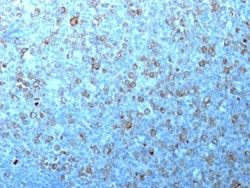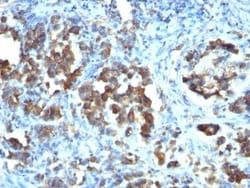CD4 Antibody (C4/206), Novus Biologicals™
Mouse Monoclonal Antibody
Manufacturer: Fischer Scientific
The price for this product is unavailable. Please request a quote
Antigen
CD4
Concentration
0.2 mg/mL
Applications
Flow Cytometry, SDS-Page, Immunofluorescence
Conjugate
Unconjugated
Host Species
Mouse
Research Discipline
Adaptive Immunity, Cell Biology, Cellular Markers, Cytokine Research, Immunology, Innate Immunity, Regulatory Immunology, Stem Cell Markers
Formulation
10mM PBS and 0.05% BSA with 0.05% Sodium Azide
Gene Alias
CD4 antigen, CD4 antigen (p55), CD4 molecule, CD4 receptor, CD4mut, T-cell surface antigen T4/Leu-3, T-cell surface glycoprotein CD4
Immunogen
Recombinant human CD4 protein
Primary or Secondary
Primary
Content And Storage
Store at 4C.
Molecular Weight of Antigen
55 kDa
Clone
C4/206
Dilution
Flow Cytometry 0.5 - 1 ug/million cells in 0.1 ml, SDS-Page, Immunofluorescence 0.5 - 1.0 ug/ml
Classification
Monoclonal
Form
Purified
Regulatory Status
RUO
Target Species
Human
Gene Accession No.
P01730
Gene ID (Entrez)
920
Isotype
IgG1 κ
Purification Method
Protein A or G purified
Test Specificity
Recognizes a protein of 55kDa, identified as CD4. CD4 is a membrane glycoprotein of T lymphocytes that interacts with major histocompatibility complex class II antigens and is also a receptor for the human immunodeficiency virus. This protein is expressed not only in T lymphocytes, but also in B cells, macrophages, and granulocytes. It is also expressed in specific regions of the brain. The protein functions to initiate or augment the early phase of T-cell activation, and may function as an important mediator of indirect neuronal damage in infectious and immune-mediated diseases of the central nervous system. Multiple alternatively spliced transcript variants encoding different isoforms have been identified
Description
- Ensure accurate, reproducible results in Flow Cytometry, Immunofluorescence CD4 Monoclonal specifically detects CD4 in Human samples
- It is validated for ELISA.


